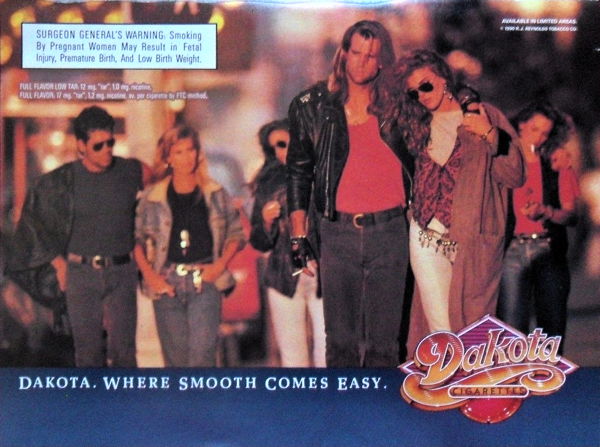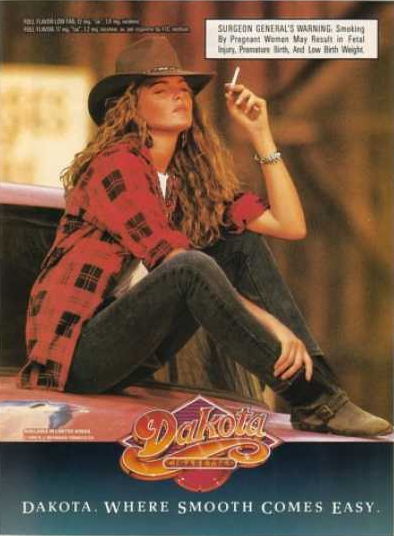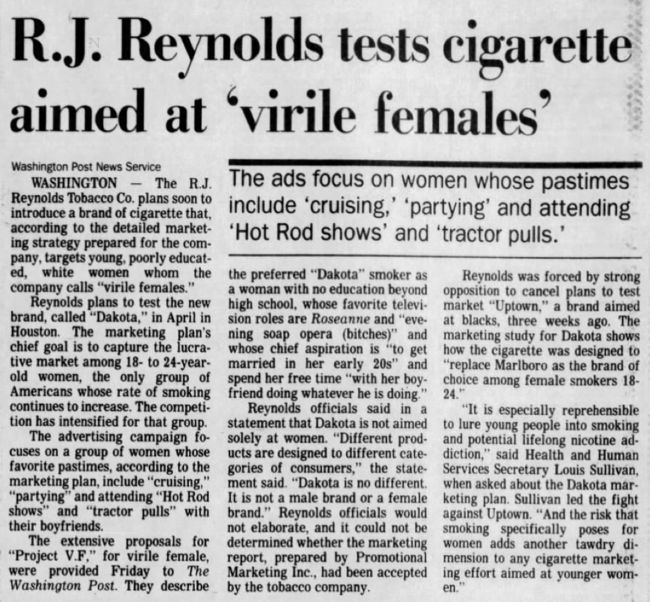Dakota Cigarettes for the Virile Female
In 1990, R.J. Reynolds test marketed a new brand of cigarette named "Dakota." But the brand immediately generated controversy when internal company documents leaked to the Washington Post revealed that the cigarettes were narrowly targeted at a demographic described as "virile females."
What exactly is a "virile female"? It was apparently "a woman with no education beyond high school, whose favorite television roles are Roseanne and 'evening soap opera (bitches)' and whose chief aspiration is 'to get married in her early 20s' and spend her free time 'with her boyfriend doing whatever he is doing.'"
The phrase "virile female" attracted a lot of interest. Many people wondered if it was acceptable English. Language columnist William Safire weighed in on the issue, asking, "Can you use virile woman without committing an oxymoronic act?" He concluded, yes you can:
He further noted that there was literary precedent for the phrase:
However, even though Safire had officially approved the phrase "virile female," the cigarettes themselves didn't perform well in the test marketing, so Reynolds scuttled the brand.



What exactly is a "virile female"? It was apparently "a woman with no education beyond high school, whose favorite television roles are Roseanne and 'evening soap opera (bitches)' and whose chief aspiration is 'to get married in her early 20s' and spend her free time 'with her boyfriend doing whatever he is doing.'"
The phrase "virile female" attracted a lot of interest. Many people wondered if it was acceptable English. Language columnist William Safire weighed in on the issue, asking, "Can you use virile woman without committing an oxymoronic act?" He concluded, yes you can:
Masculine woman is an acceptable phrase, as is effeminate man; what is meant here, however, is different from a female who acts like a male. A virile woman, as I interpret the promotional message, is "a woman who associates herself with activities and images formerly considered of primarily male interest."
He further noted that there was literary precedent for the phrase:
Etymologists will support the use of virile woman because the first appearance of the adjective, in William Caxton's 1490 translation of a French romance based on Virgil's 'Aeneid,' was in the phrase "O the fortytude viryle of wymmen."
However, even though Safire had officially approved the phrase "virile female," the cigarettes themselves didn't perform well in the test marketing, so Reynolds scuttled the brand.



Palm Beach Post - Feb 17, 1990
Comments
I admired Safire and his musings on proper use of the English language, but I think he was off the mark here. Merriam-Webster and the OED both give the same type definition:
(of a man) having strength, energy, and a strong sex drive:
‘he was a powerful, virile man’
As for the product itself, it probably failed because it tasted really bad.
(of a man) having strength, energy, and a strong sex drive:
‘he was a powerful, virile man’
As for the product itself, it probably failed because it tasted really bad.
Posted by KDP on 11/10/16 at 10:49 AM
Good thing the internal documents didn't use the phrases that probably were used in discussions -- rednecks, tramps, and trailer trash.
Posted by ges on 11/10/16 at 03:22 PM
Once again the people who sold Americans on a slow ugly poisoning and a long painful early death tried again to mix in sex and strength.
Posted by Gator Guy on 11/10/16 at 06:11 PM
Frankly, when you say "virile female", all I can think about is "stout woman with mustache who likes to hunt, watch hockey and talk at a ear-splitting level". Fortunately, the ads didn't show that.
Posted by Yudith on 11/13/16 at 06:58 AM
Believe it or not, Marlboro was originally aimed at (feminine) women. In 1940, they had a cigarette with "red beauty tips" to avoid unsightly lipstick stains.
See http://www.firstversions.com/2015/02/marlboro.html
See http://www.firstversions.com/2015/02/marlboro.html
Posted by ges on 11/13/16 at 12:02 PM
Had a one nighter with a virile female when I was young. Never resist an experience.
Posted by GFinKS on 11/14/16 at 09:41 AM
Commenting is not available in this channel entry.

Category: Products | Smoking and Tobacco | 1990s